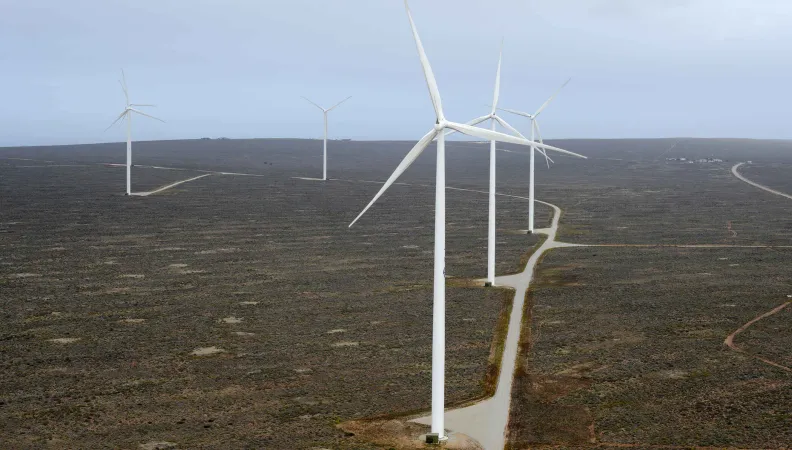Share the page
The European Union and AFD Group Work Together for a Just Transition in South Africa
Published on

Defined by the OECD as a "large emerging country," South Africa has launched an extensive program to reduce its economy’s carbon footprint. The European Union, Germany's KfW and AFD Group are working together to support the country in its essential transition.
"Joining forces." This is the mantra emphasized by Audrey Rojkoff, head of operations for AFD in South Africa: "We all have an interest in joining forces, exploring our complementary strengths, and sharing our experiences. We will be stronger together. " And by "we" Audrey Rojkoff is referring to AFD Group, of course, but also to all the public development banks operating in South Africa. A far-reaching alliance, therefore, like a local variation of the Finance in Common coalition: whereas each organization tends to act within its own sphere, AFD proposes that development banks think in terms of how they complement each other rather than compete.
Thus, a partnership between South Africa, France, Germany, Great Britain, the United States, and the European Union to promote a just energy transition was announced at COP26 in Glasgow in November 2021. The political statement that seals this partnership calls for $8.5 billion in funding to be made available: "This commitment will be implemented by the public development banks of the signatory states,” said Audrey Rojkoff. “The complementary nature of their actions will make sense and will guarantee the initiative's success.”
A necessary transition
South Africa is the twelfth largest greenhouse gas producer in the world. With a mining industry that accounts for about 10% of GDP, its energy sector is fueled mainly by coal, which provides more than 100,000 jobs and generates significant export revenues for the country. But these revenues are declining as a result of reduced demand. And the consequences of climate change are increasingly apparent.
Not only has agriculture been affected, with rising waters and flooding. Cape Town also suffered from severe water stress in 2018. As a major trading partner, the EU is also considering increasing taxes on carbon products, which would result in a slowdown in South African exports. Faced with these conflicting pressures, the country must quickly agree on a low-carbon trajectory, and adapt and diversify its energy sources.
See also: Sustainable recovery and just transition in South Africa
International partners are stepping in. A first project financed by AFD Group and KfW was launched in 2016 on behalf of the TCTA (Trans-Caledon Tunnel Authority). It involved the financing of a vast infrastructure program to mobilize and transport raw water in the Durban region. "It wasn't always easy,” recalls Ghislain Rieb, Head of AFD’s Infrastructure-Environment Division in Johannesburg. “But today, the dam exists, the investments have increased drinking water capacity of Durban, and the project is being paid for." The success of this initiative has paved the way for a method of cooperating involving the European Investment Bank (EIB), TCTA's main partner, AFD and KfW, its German counterpart.
Addressing the "gray areas"
Donors and beneficiaries are now forming partnerships in the transport and mobility sector. In conjunction with KfW and the Development Bank of Southern Africa (DBSA), AFD is contributing to financing feasibility studies to extend the Gautrain rail network, the train that links Johannesburg airport to the center of Pretoria to Sandton, the economic heart of Johannesburg. This extension is expected to be completed in 2023 or 2024.
At the same time, such joint efforts will focus on the energy transition. "In collaboration with KfW and the EIB, we have supported the financing of infrastructure necessary for developing renewable energy at Eskom,” said Ghislain Rieb. "We want to assist in dismantling old coal-fired power plants and replacing them with new power generation capacity, mainly solar and wind, which represent huge potential in the country. ”
See also: Transforming the city, strengthening social cohesion, and reducing their carbon footprint
It is in this "gray area", between coal and renewable energy that the AFD-KfW-BEI alliance is most relevant and where Eskom needs support. It is also a question of ensuring that this phase-out of coal coincides with the development of new opportunities for the inhabitants of the areas concerned.
Moving away from an industry-based approach
This is why a comprehensive approach to development is necessary: "Just transition is a sequence in which projects are interdependent,” says Audrey Rojkoff “This means developing initiatives that address all aspects of the problem. The idea is to divide the work between development banks, with each one bringing its own added value. The same goes for financing instruments: where we provide loans, the EU can step in with a grant. ”
This division of labor can be tricky, not least because of governance issues. Still, "this is a major gain for the local partner,” says Audrey Rojkoff. “In South Africa our partners are counting on AFD to play the role of a unifying force. Instead of jumping straight to the solutions for problems that need to be solved, we first focus on understanding the country's challenges, listening to South Africans’ requests, and then we try to find appropriate responses.”
The contents of this article are the sole responsibility of AFD and do not necessarily reflect the views of the European Union.
